
JOURNAL OF JEWISH THOUGHT & PHILOSOPHY
Scope & Guideline
Advancing Critical Discourse in Jewish Thought
Introduction
Aims and Scopes
- Philosophical Engagement with Jewish Texts:
The journal emphasizes in-depth analyses of classical and contemporary Jewish texts, interpreting them through various philosophical lenses. - Interdisciplinary Approaches:
The journal encourages interdisciplinary research that connects Jewish thought with other philosophical traditions, including existentialism, phenomenology, and metaphysics. - Historical Contextualization:
Papers often explore Jewish philosophy within its historical context, examining how historical events and cultural shifts have influenced Jewish thought. - Focus on Notable Jewish Philosophers:
The journal frequently highlights the works of significant Jewish philosophers such as Martin Buber, Franz Rosenzweig, and Hermann Cohen, analyzing their contributions and relevance to modern philosophical discussions. - Exploration of Jewish Mysticism and Kabbalah:
The journal includes studies on Jewish mysticism, Kabbalah, and their philosophical implications, providing insights into spiritual and metaphysical questions.
Trending and Emerging
- Interrogation of Redemption Concepts:
Recent publications have increasingly scrutinized various notions of redemption, exploring how different philosophical traditions, including Jewish thought, engage with the idea of redemption in a modern context. - Engagement with Heidegger and Continental Philosophy:
There is a growing trend of engaging with Martin Heidegger's philosophy, particularly in relation to Jewish thought, indicating a deepening interest in existential and phenomenological themes within Jewish philosophy. - Environmental Ethics and Jewish Thought:
Emerging discussions around Jewish environmental ethics reflect a contemporary concern for ecological issues, linking traditional Jewish values with modern environmental challenges. - The Role of Jewish Mysticism in Contemporary Philosophy:
There is an increasing interest in how Jewish mysticism, particularly Kabbalah, informs contemporary philosophical debates, suggesting a revival of interest in mystical traditions and their relevance today. - Cross-Cultural Philosophical Dialogues:
The journal is embracing more cross-cultural dialogues, examining how Jewish thought interacts with other philosophical traditions, particularly in discussions of redemption and ethics, reflecting a globalized scholarly approach.
Declining or Waning
- Traditional Jewish Law and Halakhah:
There has been a noticeable reduction in papers focusing specifically on traditional Jewish law (Halakhah) and its philosophical implications, suggesting a shift towards more contemporary and existential themes. - Historical Jewish Philosophy:
The focus on historical analyses of Jewish philosophy, particularly those strictly tied to earlier eras, seems to be waning in favor of more modern interpretations and applications of Jewish thought. - Ethical Discussions on Contemporary Issues:
While ethical discussions remain important, there appears to be a decline in papers that tackle contemporary ethical dilemmas from a strictly Jewish philosophical perspective, possibly indicating a broader trend towards secular ethical frameworks.
Similar Journals

Review of Rabbinic Judaism
Connecting Past and Present in Jewish ScholarshipReview of Rabbinic Judaism is a distinguished academic journal published by BRILL, focusing on the intricate history and development of Rabbinic Judaism from its origins to contemporary implications. Since its inception in 1998, it has catered to a broad audience of researchers, professionals, and students interested in the historical and religious dimensions of Judaism. The journal is currently recognized within the Q2 category in both History and Religious Studies as of 2023, indicating its significant role in scholarly discourse. Although it is not an Open Access journal, it remains accessible through various academic institutions and libraries globally. The journal's broad scope allows for diverse articles that explore theological, cultural, and textual analysis, making it a vital resource for those dedicated to the study of Jewish texts and traditions. Located in the Netherlands, Review of Rabbinic Judaism continues to contribute to the academic landscape by fostering a deeper understanding of Rabbinic thought.

Kwartalnik Historii Zydow-Jewish History Quarterly
Celebrating the Depth and Diversity of Jewish ExperiencesKwartalnik Historii Żydów - Jewish History Quarterly is a dedicated academic journal published by the esteemed Jewish Historical Institute in Warsaw, Poland. With an ISSN of 1899-3044, this quarterly publication serves as a vital platform for scholarly discourse on Jewish history, culture, and heritage. The journal aims to reflect the diversity and complexity of Jewish experiences across historical contexts, making it an essential resource for researchers, professionals, and students in the fields of History, Religious Studies, and Cultural Studies. Despite its recent coverage discontinuation in Scopus from 2012 to 2015, the journal's rankings within its respective categories indicate a modestly engaged readership and potential for contribution, particularly seen in its ranks of 339/388 in Religious Studies and 859/975 in History. Although the journal operates on a non-open access basis, its curated articles enrich the understanding of Jewish narratives and interactions within broader socio-cultural frameworks, underlining its importance in promoting historical knowledge and cultural appreciation.

Journal for the Study of Judaism
Illuminating the Legacy of Jewish ScholarshipJournal for the Study of Judaism, published by BRILL, serves as a vital platform for scholarly discourse in the fields of History, Literature and Literary Theory, and Religious Studies. With a commendable impact factor and ranking in the Q2 and Q3 quartiles across its respective categories, this journal facilitates high-quality research that explores the multi-faceted dimensions of Jewish studies from its inception in 1970 to the present day. For those who engage with the journal, the commitment to rigorous peer-review processes ensures publication of significant articles that advance knowledge and foster discussions within the academic community. As an essential resource for researchers, professionals, and students alike, the journal continues to enrich the understanding of Judaism through esteemed contributions of scholarship and critical analysis. The journal’s rich legacy and commitment to excellence make it an indispensable tool for those seeking to deepen their insight into Jewish studies and its broader implications.
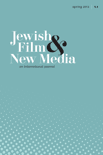
Jewish Film & New Media-An International Journal
Chronicling the Evolution of Jewish Narratives in Film and New MediaJewish Film & New Media: An International Journal, published by Wayne State University Press, serves as a crucial platform for scholars and practitioners within the realms of Film Studies, Jewish Studies, and Media Studies. Since its inception, the journal has explored the intersection between Jewish culture and cinematic representation while also addressing contemporary media narratives. With an ISSN of 2169-0324 and E-ISSN 2169-0332, it is indexed in major databases, showcasing solid rankings in various disciplines, including a commendable Q2 rank in Visual Arts and Performing Arts. Despite its current Q4 categorizations in Anthropology and Communication, the journal is noted for its engaging contributions that sow rich discussions about Jewish identity, filmic expression, and media representation. Researchers and students alike benefit from the journal’s wealth of interdisciplinary scholarship, which spans converged years from 2013 to 2017 and 2019 to 2022, ensuring a robust timeline of critical inquiry. As an essential resource for understanding the nuances of Jewish film and new media, this journal occupies a unique niche, inviting contributions that push the boundaries of current academic dialogue.
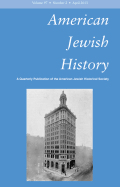
AMERICAN JEWISH HISTORY
Uncovering Narratives, Shaping IdentitiesAMERICAN JEWISH HISTORY is a premier academic journal published by Johns Hopkins University Press, dedicated to the exploration and analysis of the Jewish experience in the American context. With ISSN 0164-0178 and E-ISSN 1086-3141, this journal serves as a vital resource for scholars and students in the fields of cultural studies, history, and religious studies, as evidenced by its placement in the Q3 quartile across these disciplines in 2023. Reaching a broad audience interested in the historical, social, and cultural dimensions of the American Jewish narrative, the journal has converged in various years, ensuring a robust collection of multidisciplinary research and discussions. Although it operates under a traditional subscription model, the journal remains an essential platform for critical analysis, fostering deeper understanding of Jewish identity and history. With Scopus rankings placing it at the 60th percentile in History and 62nd percentile in Religious Studies, AMERICAN JEWISH HISTORY stands as a respected publication that significantly contributes to the discourse surrounding Jewish history and culture in the United States.
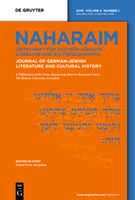
Naharaim
Connecting Global Scholars through Near Eastern DiscourseNaharaim is a distinguished academic journal dedicated to fostering interdisciplinary scholarship in the field of Near Eastern studies. Published by Walter de Gruyter GmbH, this journal aims to provide a platform for innovative research that explores the rich historical, cultural, and social dynamics of the region. With an ISSN of 1862-9148 and an E-ISSN of 1862-9156, Naharaim adheres to high academic standards, although it does not currently offer open access options. The journal aspires to engage a global audience of researchers, professionals, and students eager to contribute to and gain insights from the evolving discourse surrounding Near Eastern cultures and histories. Through rigorous peer-reviewed articles, Naharaim plays a vital role in advancing knowledge and understanding in a field of study that is increasingly relevant in today’s interconnected world.

Quest-Issues in Contemporary Jewish History
Empowering Research in the Landscape of Jewish StudiesQuest - Issues in Contemporary Jewish History is a pivotal open-access journal published by the Fondazione Centro Documentazione Ebraica Contemporanea in Italy. Since its inception in 2010, this journal has been dedicated to the scholarly exploration of the multifaceted dimensions of contemporary Jewish history, making significant contributions to the fields of history and cultural studies. With an ISSN of 2037-741X, it serves as a vital platform for researchers, professionals, and students alike, providing access to an array of insightful articles and research findings. As of 2023, it holds a respectable Q3 ranking in the History category within Scopus, indicating its growing influence in academia, alongside a rank of #899 out of 1760 in Arts and Humanities – History. This makes it an essential resource for those looking to deepen their understanding of Jewish history in a contemporary context. The journal, with its rich scholarly outputs converging from 2017 to 2023, is based in Milan and strives to foster high-quality research in Jewish studies.
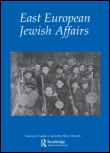
East European Jewish Affairs
Fostering Understanding of Jewish Cultural Narratives in Eastern EuropeEast European Jewish Affairs is a prominent scholarly journal published by Routledge Journals, Taylor & Francis Ltd, dedicated to exploring the intricate historical, cultural, and political dynamics of Jewish communities in Eastern Europe. With ISSN 1350-1674 and E-ISSN 1743-971X, this journal has been a critical platform for academic discourse since its inception in 1992, resuming publication after a hiatus in 2005. Although it is not an open-access journal, it provides vital insights into Jewish studies, engaging researchers, professionals, and students alike with in-depth analyses and discussions. The journal currently holds a Q4 ranking in multiple categories, including Cultural Studies, History, and Political Science and International Relations, reflecting its niche yet significant contribution to these fields. The 2023 Scopus rankings position it within the 34th percentile in History and the 10th percentile in Political Science, evidencing its specialized focus and the evolving nature of Jewish studies. For those investigating the unique social and cultural trajectories of East European Jewish communities, East European Jewish Affairs serves as an essential resource.

JEWISH SOCIAL STUDIES
Illuminating the past, present, and future of Jewish social thought.Jewish Social Studies is a prominent peer-reviewed journal published by Indiana University Press, dedicated to advancing the field of Jewish scholarship through interdisciplinary exploration and critical inquiry. With an ISSN of 0021-6704 and an E-ISSN of 1527-2028, this journal has become a vital resource for researchers and scholars, achieving Q2 rankings in both History and Religious Studies, as well as strong standings in Anthropology and Cultural Studies. The journal bridges the gaps between diverse academic disciplines, focusing on the multifaceted dimensions of Jewish life, culture, and history, making it essential reading for anyone engaged in the study of Judaism. Although it does not currently offer Open Access options, the journal promotes a wealth of rigorous research, critical perspectives, and in-depth analyses that contribute significantly to the understanding of Jewish Studies from 1975 to the present day, with ongoing issues scheduled until 2024. With an established audience of scholars, professionals, and students, Jewish Social Studies remains a leading platform for intellectual discourse and scholarly exchange in the humanities.
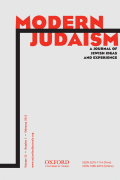
MODERN JUDAISM
Illuminating the Intersection of History and ModernityMODERN JUDAISM is a premier journal dedicated to the multifaceted exploration of Jewish culture, history, and religious practice, providing a significant platform for scholarly discourse since its inception in 1981. Published by Oxford University Press Inc in the United States, this journal stands out with its diverse engagement across disciplines, reflected in its commendable 2023 category quartiles: Q2 in Cultural Studies and History, Q1 in Religious Studies, and notable rankings in Political Science and Sociology. With an impact factor that underscores its rigorous peer-review process and scholarly relevance, MODERN JUDAISM serves as an essential resource for researchers, professionals, and students alike, fostering an academic environment conducive to innovative ideas and comprehensive studies. Although not open access, the journal remains crucial for anyone looking to deepen their understanding of contemporary Jewish thought and its intersection with broader cultural and political currents. For further inquiry or submissions, please refer to the Journals Department at 2001 Evans Rd, Cary, NC 27513.